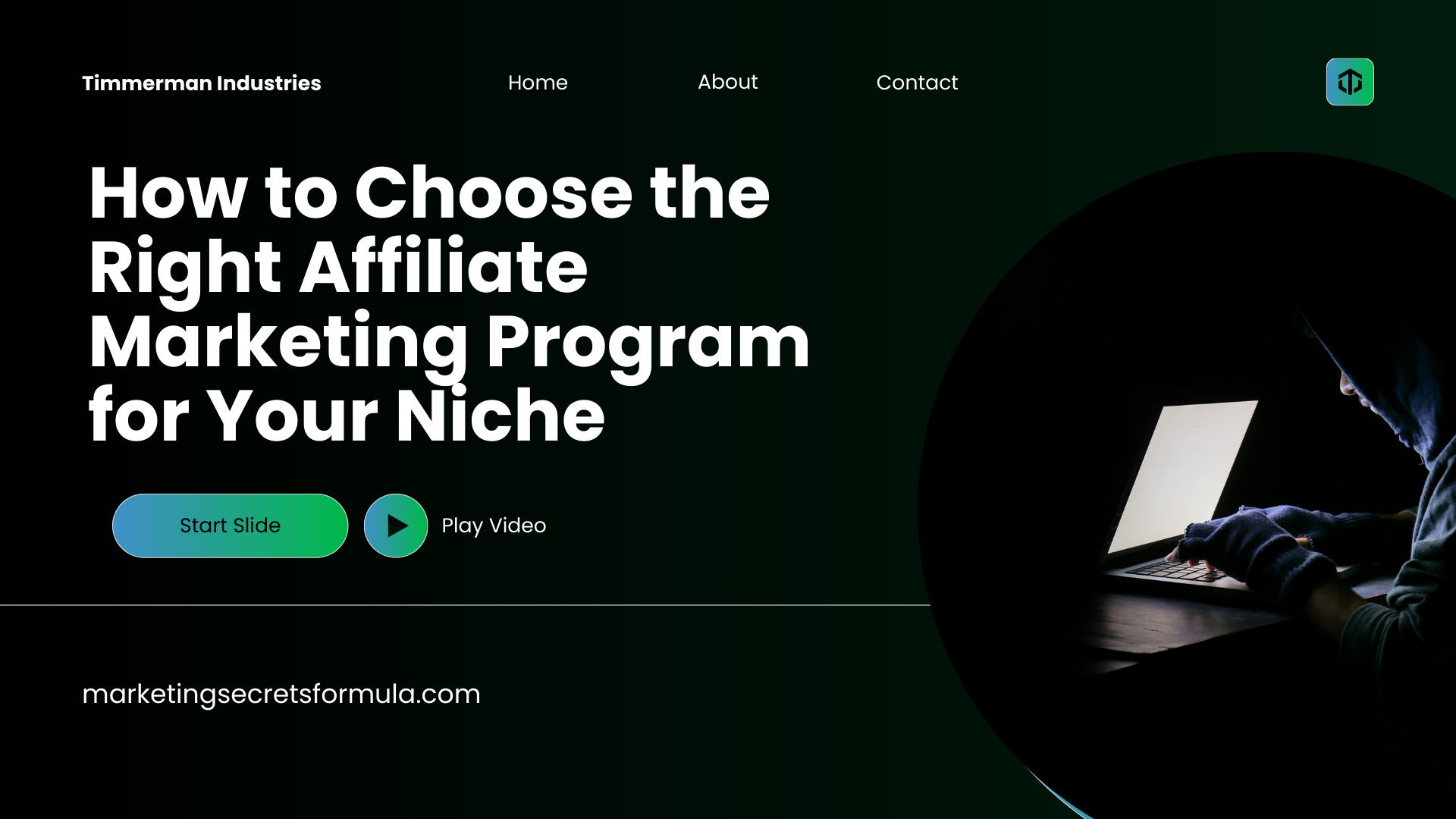Welcome to my article “How to Choose the Right Affiliate Marketing Program for Your Niche” Choosing the right affiliate marketing program for your niche is a bit like picking out the perfect pair of shoes: if it doesn’t fit, it’s just going to cause a world of pain (and zero conversions). In the bustling world of affiliate marketing, where there are countless programs vying for your attention, it’s tempting to jump on the first one with a high commission rate. But as any seasoned affiliate will tell you, this strategy can backfire faster than you can say “return to sender.” Picking a program that truly aligns with your niche and audience is the secret ingredient to sustainable success—and a more engaged, loyal following.
Why is choosing the right program so important? Not exactly a match made in heaven, right? When you choose affiliate programs that resonate with your niche, you’re not just selling products; you’re curating a trusted experience for your audience, and that leads to more clicks, higher conversion rates, and better commissions in the long run.
In this guide, we’ll break down everything you need to know about finding the perfect affiliate marketing program for your niche. From understanding your audience’s needs to evaluating commission structures and avoiding the dreaded fine print, we’ve got you covered. Ready to find that affiliate program that feels like it was tailor-made just for you? Let’s dive in and turn those clicks into cash!
Access My Proven Tested Formula for $50-$100 Daily Income – Watch This FREE Video Now >>>

Understand Your Audience and Niche Needs
Understanding your audience is like having a backstage pass to their needs, wants, and quirks. Without this insight, choosing an affiliate program is like shooting in the dark—you might hit something, but odds are, it won’t be what they’re looking for. To make affiliate marketing work, you’ve got to know what makes your audience tick, what keeps them up at night, and what kind of solutions they’d actually open their wallets for. Think of it as relationship-building: the more you understand their specific needs, the easier it is to choose products they’ll genuinely find helpful (and, you know, worth clicking on).
Start by asking yourself: Who is your audience, really? Are they fitness enthusiasts looking for the latest gear, home-cooking aficionados searching for unique ingredients, or maybe tech buffs eager to try the newest gadgets? Each niche has its unique flavor, and tapping into that can make all the difference in affiliate marketing success. When you understand these details, you’re no longer just a marketer—you’re a curator, selecting products that feel perfectly crafted to suit your followers’ interests and solve their pain points.
Knowing your audience’s needs also means knowing their price range, lifestyle, and trust level with certain brands or product types. For instance, if your followers are mostly students on a budget, pushing high-end luxury products may lead to more eye-rolls than clicks. But if they’re seasoned professionals looking for quality tools to streamline their workflow, premium options could be the perfect fit. Once you’re clear on who your audience is and what they truly want, choosing the right affiliate program becomes a whole lot easier—and your recommendations start to feel like a friend’s trusted advice rather than just another sales pitch.
Evaluate Commission Rates and Payout Models
Evaluating commission rates and payout models in affiliate marketing is a bit like shopping for deals online—you don’t just pick the first offer that pops up; you dig a little deeper to see where the real value lies. A program might boast sky-high commission rates, but the fine print could reveal a catch or two. Let’s dive into what you need to look for to ensure that the payout structure truly supports your goals (and doesn’t leave you chasing pennies).
First, let’s talk about the different types of commission models. In affiliate marketing, not all commissions are created equal. You’ve got the standard pay-per-sale, which rewards you every time someone makes a purchase through your link. This is the most common setup and can be lucrative, especially if the commission rate is decent. Then there’s pay-per-click (PPC), which gives you a cut just for bringing traffic, regardless of whether your audience buys anything. Each model has its pros and cons, and the right one for you depends on your niche and how your audience interacts with your content.
Now, onto commission rates themselves. High commissions might sound appealing, but always consider the bigger picture. Some programs offer 50% commissions on low-cost items, which can be great for volume but may not add up quickly if the individual payouts are tiny. Others might offer a lower percentage on high-ticket items, which could mean fewer sales but bigger paychecks when they do come through. It’s all about balance. And don’t forget the payout thresholds and schedules—some programs will make you wait until you hit a certain amount or only pay out quarterly, which can slow down your cash flow if you’re just starting.
Access My Proven Tested Formula for $50-$100 Daily Income – Watch This FREE Video Now >>>
So, when evaluating affiliate programs, look for a commission structure that fits both your content style and your audience’s buying behavior. This way, you’re setting yourself up for earnings that don’t just look good on paper but actually make sense for your bottom line.
Assess Program Reputation and Support
When it comes to choosing an affiliate program, reputation and support are like the foundation of a solid house—overlook them, and you’re asking for trouble down the line. After all, there’s nothing worse than working hard to promote a program only to find out it’s notorious for delayed payments, poor customer service, or disappearing altogether. Assessing a program’s reputation and support system can save you a world of headaches and set you up for long-term success with partners who actually have your back.
Start with a bit of reputation sleuthing. A good affiliate program will have a solid track record, a loyal user base, and positive feedback from affiliates. Check out reviews on affiliate forums, social media groups, or sites like Trustpilot to see what other affiliates have to say. If you see a pattern of complaints—especially ones around payment issues or unresponsive support—that’s a red flag waving loud and clear. Remember, if a program isn’t treating its affiliates well, it’s probably not going to make an exception for you.
Once you’ve done your detective work, look into the support that the program offers. Good affiliate programs know that when their affiliates succeed, they succeed too, and they’ll often provide resources to help you do just that. Whether it’s marketing materials, exclusive training, or a dedicated affiliate manager who can answer questions, these support options can make a world of difference. You don’t want to feel like you’re flying solo if issues arise or if you just need guidance on best practices.
In the end, a reputable affiliate program with good support can make your job infinitely easier. It means you’ll have reliable partners who pay on time, offer resources to maximize your success, and don’t ghost you when you need a hand. So, don’t skimp on the research here—your peace of mind and profitability depend on it.
Analyze Product Quality and Brand Fit
When it comes to affiliate marketing, product quality and brand fit are non-negotiables. Imagine recommending a low-quality product to your followers—one that doesn’t just underperform but completely flops. Not only does this risk your audience’s trust, but it also lowers the chances that they’ll come back for your next recommendation. So, before diving into any affiliate partnership, take a good, hard look at what you’re promoting and make sure it genuinely matches both your audience’s needs and your brand’s vibe.
Let’s start with product quality. If you wouldn’t buy it yourself, why would you ask your audience to? High-quality products can make all the difference, not just in terms of building credibility but in driving conversions. People can sense when you’re genuinely excited about a product versus when you’re just trying to make a quick buck. And quality doesn’t have to mean luxury; it’s all about products that do what they promise, deliver good value, and satisfy customer needs. Bonus points if you can try out the product yourself or dive into honest user reviews before making the call to promote it.
Now, let’s talk about brand fit. Aligning with brands that match your values and your audience’s interests creates a more seamless and authentic experience. If your niche is eco-friendly living, for instance, promoting products from a brand that’s known for sustainability will resonate far better than one with a questionable environmental record. Think of it this way: your audience follows you because they trust your taste, your recommendations, and, yes, your integrity. When you choose brands that align with those qualities, you’re building a relationship that goes beyond transactions—it’s about creating genuine value for your audience.
Access My Proven Tested Formula for $50-$100 Daily Income – Watch This FREE Video Now >>>
In short, high-quality products and well-aligned brands are your keys to a successful affiliate marketing strategy. They keep your audience engaged, your reputation strong, and your income potential higher. Remember, every affiliate recommendation is a reflection of your brand, so make it one that you (and your audience) can be proud of.
Review Program Terms and Conditions Carefully
Reviewing an affiliate program’s terms and conditions might sound about as exciting as reading a novel-length legal document, but trust me—this is one step you don’t want to skip. Hidden in that fine print are the rules of the road, and if you accidentally overlook something critical, you could end up losing commissions or even getting kicked out of the program. A careful read-through upfront can help you avoid nasty surprises and make sure you’re set up for smooth sailing (and steady earnings).
First off, pay special attention to the cookie duration. In affiliate marketing lingo, cookies are what track your referral, and the duration determines how long you’ll get credit if someone clicks your link but takes their sweet time to make a purchase. Some programs offer generous 30- or 60-day cookies, meaning that if a customer buys anytime within that period, you get the commission. Others, however, may only give you 24 hours or less! Knowing this duration is key, especially if your audience tends to research before buying.
Next up, check out the payment terms and minimum payout thresholds. Some programs make it easy, paying out monthly with no minimum, while others require you to hit a certain dollar amount (sometimes a hefty one) before you see any cash. Be realistic about how quickly you can meet these thresholds; a program with a high minimum payout might not be the best fit if you’re just starting out or working in a low-volume niche. And don’t forget to look at the payment methods—whether it’s PayPal, direct deposit, or another option—because if the program only offers methods you can’t use, it could throw a wrench in your earning plans.
Finally, keep an eye out for any promotional restrictions. Some programs have strict rules about how you can market their products—like banning certain keywords in search ads, restricting social media promos, or prohibiting email marketing. Violating these rules, even by accident, can cost you your commissions or worse, get you banned from the program. So, take a little time upfront to review the terms and conditions in full; it’s a small effort that pays off by keeping you on the program’s good side and ensuring that every click counts.
Conclusion
In the world of affiliate marketing, picking the right program isn’t just about signing up and slapping a few links on your website; it’s a strategic move that can make or break your success. By taking the time to truly understand your audience, analyze product quality, evaluate commission structures, and comb through the terms and conditions, you’re setting yourself up for a win-win partnership—one where your audience finds value in what you share, and you earn a steady, reliable income.
Think of it as building a bridge between quality brands and your loyal followers. When you recommend programs that align with your audience’s needs and values, you’re not just boosting clicks and conversions; you’re building trust, and that’s the foundation of a sustainable affiliate income. The extra effort upfront—researching, evaluating, and picking programs wisely—pays dividends by turning your affiliate marketing efforts into an authentic extension of your brand rather than a hard sell.
Access My Proven Tested Formula for $50-$100 Daily Income – Watch This FREE Video Now >>>
So, whether you’re just starting or looking to level up, remember that choosing the right affiliate program is more than just a business decision; it’s about creating a genuine connection with your audience. With the right program, you’re not just promoting products—you’re sharing solutions, building relationships, and, ultimately, growing a brand that people can depend on. Now, go find that perfect affiliate program and make every click count!
Thanks a lot for reading my article on “How to Choose the Right Affiliate Marketing Program for Your Niche” till the end. Hope you’ve helped. See you with another article.










